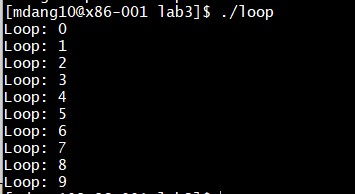RE-POST February: SPO600 Week 5 Part 1
This post would be about what I have learned during my fifth week of Software Portability and Optimization (SPO600) class.
Continuing off from the previous post, first access the server and then go to the following link to copy and paste the basic loop in AArch64 and x86 assembler: https://toronto.tylers.info/dokuwiki-toronto/doku.php?id=spo600:64-bit_assembly_language_lab (updated 2024-04-17, due to the previous wiki not working)
.text
.globl _start
min = 0 /* starting value for the loop index; **note that this is a symbol (constant)**, not a variable */
max = 10 /* loop exits when the index hits this number (loop condition is i<max) */
_start:
mov x19, min
loop:
/* ... body of the loop ... do something useful here ... */
add x19, x19, 1
cmp x19, max
b.ne loop
mov x0, 0 /* status -> 0 */
mov x8, 93 /* exit is syscall #93 */
svc 0 /* invoke syscall */
Similarly, do the same for the x86 machine, however, using the following code instead:
.text
.globl _start
min = 0 /* starting value for the loop index; **note that this is a symbol (constant)**, not a variable */
max = 10 /* loop exits when the index hits this number (loop condition is i<max) */
_start:
mov $min,%r15 /* loop index */
loop:
/* ... body of the loop ... do something useful here ... */
inc %r15 /* increment index */
cmp $max,%r15 /* see if we're done */
jne loop /* loop if we're not */
mov $0,%rdi /* exit status */
mov $60,%rax /* syscall sys_exit */
syscall
Notice that in aarch64, the add line has 3 arguments while in x86 have a function called increment. In another programming language, it would look something like this:
min = min + 1; OR min++;
To run the file, make a Makefile first:
vi Makefile
add the following code:
loop: loop.s
as -g loop.s -o loop.o
ld -g loop.o -o loop
The run the make command:
Then the executable can now be run: ./loopNothing would show up since there is nothing in the body. To display some data, we can copy and paste the hello .data part and change the display like so:
.data
msg: .ascii "Loop\n"
len= . - msg
mov x0, 1 /* file descriptor: 1 is stdout */
adr x1, msg /* message location (memory address) */
mov x2, len /* message length (bytes) */
mov x8, 64 /* write is syscall #64 */
svc 0 /* invoke syscall */
make loop
./loop
.text
.globl _start
min = 0 /* starting value for the loop index; **note that this is a symbol (constant)**, not a variable */
max = 10 /* loop exits when the index hits this number (loop condition is i<max) */
_start:
mov x19, min
loop:
/* Convert loop counter to char*/
add x15, x19, 0x30 /* add 48 to convert to char */
adr x14, msg+6
strb w15, [x14]
/* Print the message */
mov x0, 1 /* file descriptor: 1 is stdout */
adr x1, msg /* message location (memory address) */
mov x2, len /* message length (bytes) */
mov x8, 64 /* write is syscall #64 */
svc 0 /* invoke syscall */
/* Continue the loop */
add x19, x19, 1
cmp x19, max
b.ne loop
/* Exit the program */
mov x0, 0 /* status -> 0 */
mov x8, 93 /* exit is syscall #93 */
svc 0 /* invoke syscall */
.data
msg: .ascii "Loop: #\n"
len= . - msg
.text
.globl _start
min = 0 /* starting value for the loop index; **note that this is a symbol (constant)**, not a variable */
max = 10 /* loop exits when the index hits this number (loop condition is i<max) */
_start:
mov $min,%r15 /* loop index */
loop:
/* Convert loop counter to char */
mov %r15, %r14
add $'0', %r14
mov $msg+6, %r13
mov %r14b,(%r13)
/* Print the message */
movq $len,%rdx /* message length */ movq $msg,%rsi /* message location */ movq $1,%rdi /* file descriptor stdout */
movq $1,%rax /* syscall sys_write */
syscall
/* Continue the loop */
inc %r15 /* increment index */
cmp $max,%r15 /* see if we're done */
jne loop /* loop if we're not */
/* Exit the program */
mov $0,%rdi /* exit status */
mov $60,%rax /* syscall sys_exit */
syscall
.section .data
msg: .ascii "Loop: #\n"
len = . - msg
gdb loop
.text
.globl _start
min = 0 /* starting value for the loop index; **note that this is a symbol (constant)**, not a variable */
max = 10 /* loop exits when the index hits this number (loop condition is i<max) */
_start:
mov $min,%r15 /* loop index */
loop:
/* Convert loop counter to char */
mov %r15, %r14
add $'0', %r14
mov %r14b,msg+6
/* Print the message */
movq $len,%rdx /* message length */
movq $msg,%rsi /* message location */
movq $1,%rdi /* file descriptor stdout */
movq $1,%rax /* syscall sys_write */
syscall
/* Continue the loop */
inc %r15 /* increment index */
cmp $max,%r15 /* see if we're done */
jne loop /* loop if we're not */
/* Exit the program */
mov $0,%rdi /* exit status */
mov $60,%rax /* syscall sys_exit */
syscall
.section .data
msg: .ascii "Loop: #\n"
len = . - msg






Comments
Post a Comment